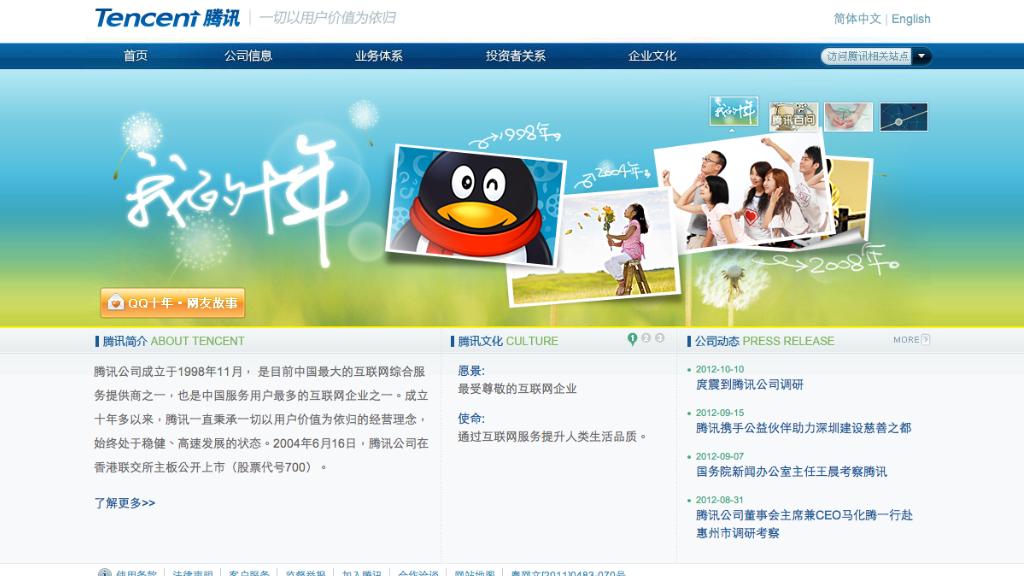
Peter Pham, a capital market specialist and entrepreneur with expertise in institutional sales and trading, is the author of AlphaVN.com, an investing blog focusing on Vietnam and other markets in Southeast Asia. He is also the author of the upcoming book, The Big Trade: Simple Strategies for Maximum Market Returns.
As the West deals with the overhang of too much debt and a potential fiscal cliff in the United States, some of the economies of Asia have remained quite resilient.
Malaysia, Thailand and Indonesia have continued to report economic growth above IMF projections and also have relatively low inflation rates. China, despite a slowing economy, is still growing at a pace that is the envy of the developed world.
The Asian growth story has not been derailed. And even though there may be a global slowdown in 2013, there are several companies in Asia well-positioned for strong growth over the next few years.
These five represent a mix of economies and sectors.
Tencent: Tencent is one of China's largest Internet companies, providing services from microblogging (QQ.com) to a handful of online games.
I love their acquisition of Riot Games, whose immensely popular League of Legends has more than 33 million players worldwide. Tencent has also purchased stakes in other gaming distribution companies serving the Philippines, Singapore and Brazil and has secured China licensing deals with Zynga (ZNGA) and Electronic Arts (EA)-owned Popcap as well.

This is a growth play on the burgeoning middle class and youthful demographics around Asia. In Tencent's most recent quarter, sales surged 80% from a year ago.
The stock, which trades in Hong Kong under the ticker symbol 0700 and has a small number of shares listed in New York, is not cheap. It trades at nearly 30 times 2012 earnings estimates. But Tencent (TCEHY)may be worth it as long as it continues to grow so rapidly. I like Tencent more than other Chinese online media firms like Baidu (BIDU) and Sina (SINA) because of Tencent's ability to generate fees from games as opposed to being so dependent on mobile ad revenue
Keppel Corp: Keppel, based in Singapore, is the largest builder of offshore oil rigs in the world. The company trades in Singapore under the ticker KEP. Keppel (KPELY) also has thinly traded shares listed in New York.
Related: Is Indonesia the newest BRIC?
As the search to replace reserves pushes oil exploration and production into more risky environments, offshore rigs will become a larger part of the market, especially in Asia.
Keppel is a conglomerate that also provides engineering services and builds power stations, waste management facilities and waste-to-energy plants. It is currently trading at a reasonable valuation of about 11 times earnings estimates for next year and it pays a dividend that yields 3.9%.
Cache Logistics Trust: This real estate investment trust invests in warehouses around Singapore. The stock trades under the symbol CACHE in Singapore and there is no listing in the U.S.
I am bullish in general about the economies of Southeast Asia. Singapore REITs have done particularly well in the past 18 months -- especially ones focused on office and commercial property. While many of them are trading at premium prices now, CLT is valued at less than 13 times estimates and pays a dividend yielding 6.5%.
Singapore's status as a commodities trading hub will only increase with Asia's rise as a manufacturing and consumption powerhouse. A REIT that serves this market is less prone to price fluctuations than the commodities themselves.
Advanced Info Services: AIS is the largest telecom company in Thailand. Singapore Telecom, the region's largest carrier, has a 23% stake in AIS. But I like AIS over SingTel because of its improving fundamentals. AIS has pushed net margins up from 14.8% in 2008 to 17.6% in 2011, while SingTel's margins have contracted from 23.1% to 21.2% in the same time period.
AIS is a solid way to invest in the continued growth of Thailand's economy, where a larger middle class is emerging. AIS is a more pure play on Asian telecom growth without the baggage of SingTel's presence across multiple markets.
Related: Starbucks opens first store in India
AIS is also a high growth and well-managed company -- it reported a stunning return on assets of 26.8% last year -- that trades at a multiple that a value investor could love. The stock is valued at less than 17 times earnings estimates for next year and the company pays a dividend that yields 5.0%. Shares trade on the stock exchange of Thailand under the symbol ADVANC.
EDL-Generation: For a pure frontier market play, power company EDL-Generation in Laos is a good bet. EDL-Gen was the first company to be listed on the Laos Stock Exchange, where it trades under the ticker symbol EDL.
The electricity business in Laos is an industry that is set to grow at a compounded annual growth rate of 19% through 2020. By 2015, Laos will be a net exporter of electricity to their neighbors in China and Vietnam. EDL paid a dividend in 2011 that yielded 10.3%. Shares trade at only 7 times earnings estimates -- even though profits are expected to grow 30% this year.
For investors who are wary of investing directly in this area of the world, there are a number of large ETFs which own some of these companies.
Keppel is heavily represented in the iShares Singapore Index ETF (EWS) while AIS is owned in the iShares Thailand Index ETF (THD). For Tencent, the Guggenheim China Technology ETF (CQQQ) has the highest exposure to the company. But the fund is heavily concentrated. Its top three holdings -- Tencent, Baidu and Lenovo Group -- constitute more than 27% of the fund.


